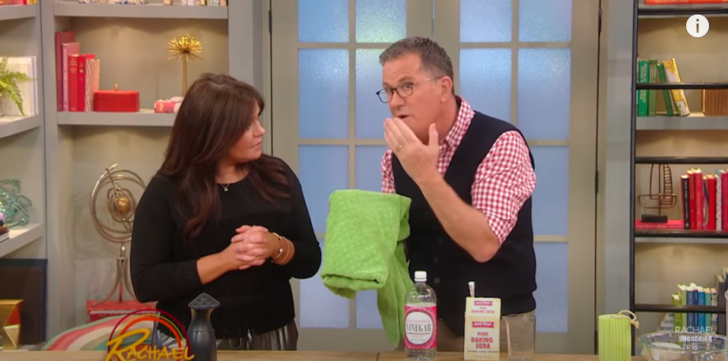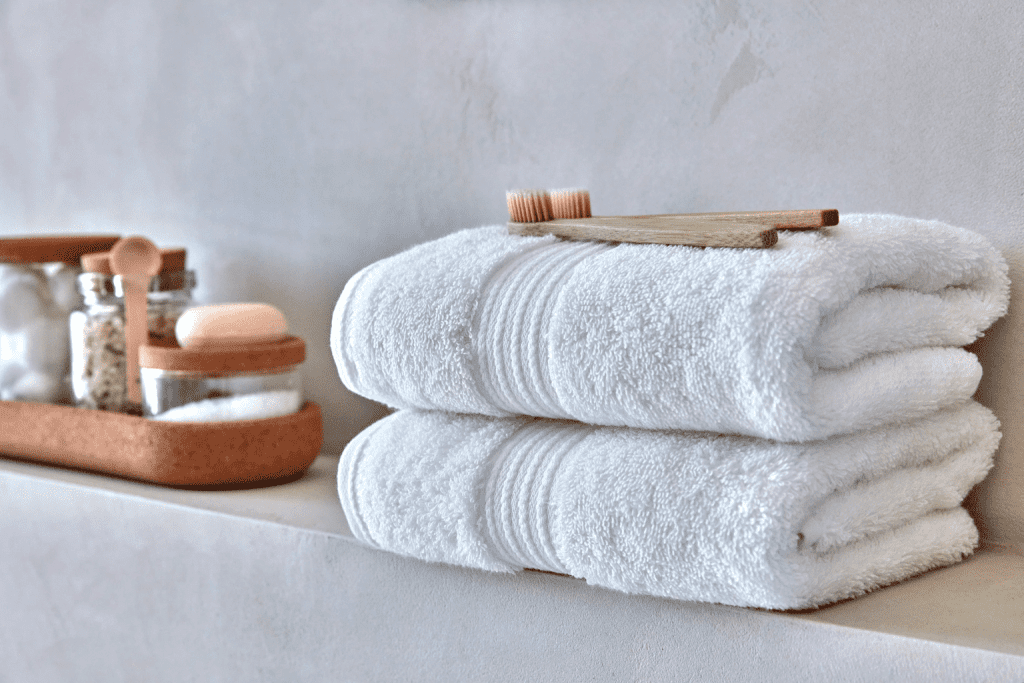Towels are an essential part of our daily routine, whether we’re drying off after a shower or wiping down kitchen counters. But how often should you really be cleaning them? It’s a question most of us probably haven’t thought about enough, and if you’re like many people, you might not be washing them as often as you should. Towels, especially those used in damp environments like bathrooms and kitchens, can quickly become breeding grounds for bacteria and mold. In this article, we’ll explore how frequently you should be washing your towels and why it’s important to keep them clean.

The Importance of Regular Towel Cleaning
Let’s face it: towels do the dirty work. Whether it’s mopping up spills, wiping our hands, or drying our bodies, towels absorb moisture, dead skin cells, oils, and bacteria. Over time, if not cleaned regularly, they become less hygienic and can even start to develop unpleasant odors.
Peter Walsh, an expert in home organization, recently appeared on The Rachael Ray Show to explain why regularly cleaning towels is crucial for maintaining a healthy home environment. According to Walsh, “The issue is not so much the towel, it’s the wet, moist environment where there’s lots of humidity in the bathroom.” This is especially true for towels that stay damp for too long—giving bacteria the perfect environment to grow. So how often should you be washing your towels? Let’s break it down.
1. Bath Towels: Wash Every 3-4 Uses
After a refreshing shower, your bath towel might seem clean, but that doesn’t mean it’s free from bacteria. The warm, damp conditions in your bathroom are ideal for bacterial growth, so it’s important to wash bath towels every three to four uses. If your towel feels damp when you’re about to use it, that’s a clear sign it hasn’t fully dried between uses and could be harboring germs.
Additionally, to prevent bacteria from spreading, make sure to hang your towel up properly after each use so it can dry completely. Avoid leaving towels bunched up on the floor or draped in a way that keeps them damp for long periods.
2. Hand Towels: Wash Every 1-2 Days
Hand towels in both the bathroom and kitchen get a lot of use throughout the day, making them one of the most important items to clean regularly. Because they come into contact with hands that might not be thoroughly clean, hand towels should be washed every one to two days to prevent the spread of bacteria. In high-traffic areas or during cold and flu season, washing them even more frequently might be necessary.
Walsh advises that we also need to pay close attention to how these towels dry. Folding them while they are still damp or not providing adequate airflow can lead to a musty smell and bacterial growth.
3. Kitchen Towels: Wash Daily or After Each Use
Kitchen towels may seem innocent enough, but they’re often used for tasks ranging from drying dishes to wiping up spills. Given how frequently they’re exposed to food particles, moisture, and various surfaces, kitchen towels should be washed daily or after each use, especially if they’ve come into contact with raw foods or greasy spills.

While you may be tempted to reuse kitchen towels for days at a time, this habit increases the risk of cross-contamination, especially when working with raw meats or cleaning surfaces where food is prepared. Regular cleaning ensures your kitchen stays hygienic and reduces the risk of spreading harmful bacteria.
4. Dish Rags: Wash After Every Use
Dish rags are another hot spot for bacteria. These absorbent cloths are often used to scrub dishes, countertops, and other surfaces, making them prone to harboring germs. It’s best to wash dish rags after every use to keep them from becoming breeding grounds for bacteria. Even if the dish rag doesn’t smell, it could still be harboring unseen germs from wiping down kitchen surfaces.
In between uses, allow dish rags to dry completely, as moisture speeds up bacterial growth. You can also rotate between several rags, allowing some to dry while others are in use.
5. Gym Towels: Wash After Every Workout
Gym towels absorb sweat, which means they can quickly become a haven for bacteria if not cleaned promptly. If you bring a towel to the gym or use it during a workout at home, it’s essential to wash it after every session. Gym towels that aren’t washed after each use can harbor bacteria, which may lead to skin irritation or infections.
Additionally, ensure that your gym towel dries fully after washing. Towels that stay damp in a gym bag or laundry basket for too long can develop mold or mildew, making them less effective and more prone to unpleasant odors.
6. Beach Towels: Wash After Every Use
Beach towels are exposed to sand, saltwater, chlorine, and sunscreen, which means they should be washed after every use. These elements can degrade the towel’s fibers if left for too long and can also trap bacteria within the material. Washing beach towels promptly will help keep them in good condition and prevent any odors or bacterial buildup.
Like other towels, allow beach towels to dry thoroughly after washing to prevent mold from growing in their thick fabric.
The Risks of Not Washing Towels Regularly
Using towels that aren’t cleaned frequently can lead to several issues, from unpleasant smells to health concerns. Dirty towels can harbor bacteria like E. coli, Staphylococcus, and mold, which can cause skin irritation, rashes, and infections, especially if you have any open cuts or sensitive skin.

Walsh explains that keeping towels folded when wet is a common mistake, as it prevents proper air circulation and encourages bacteria growth. So not only is frequent washing important, but how you care for and store your towels between uses is equally critical.
How to Properly Wash Your Towels
Now that you know how often to wash your towels, let’s go over some tips for washing them properly:
- Use hot water: Hot water helps kill bacteria and germs. Use the hottest setting your towels can tolerate, as indicated on the care label.
- Avoid fabric softener: While fabric softener makes towels feel fluffy, it can reduce absorbency over time. Instead, use vinegar during the rinse cycle to soften towels without affecting their ability to absorb water.
- Dry completely: Ensure towels are thoroughly dried before folding or storing them. Towels that are put away while still damp are likely to develop mildew and unpleasant odors.
Conclusion
Keeping towels clean is essential for maintaining good hygiene and preventing the spread of bacteria and germs. By washing bath towels every three to four uses, hand towels every one to two days, and kitchen towels daily, you can keep your home safe and fresh. Remember to store towels in a way that allows them to dry properly, and don’t hesitate to replace old, worn-out towels with new ones when needed. With these simple habits, your towels will remain fresh, hygienic, and ready for use whenever you need them.